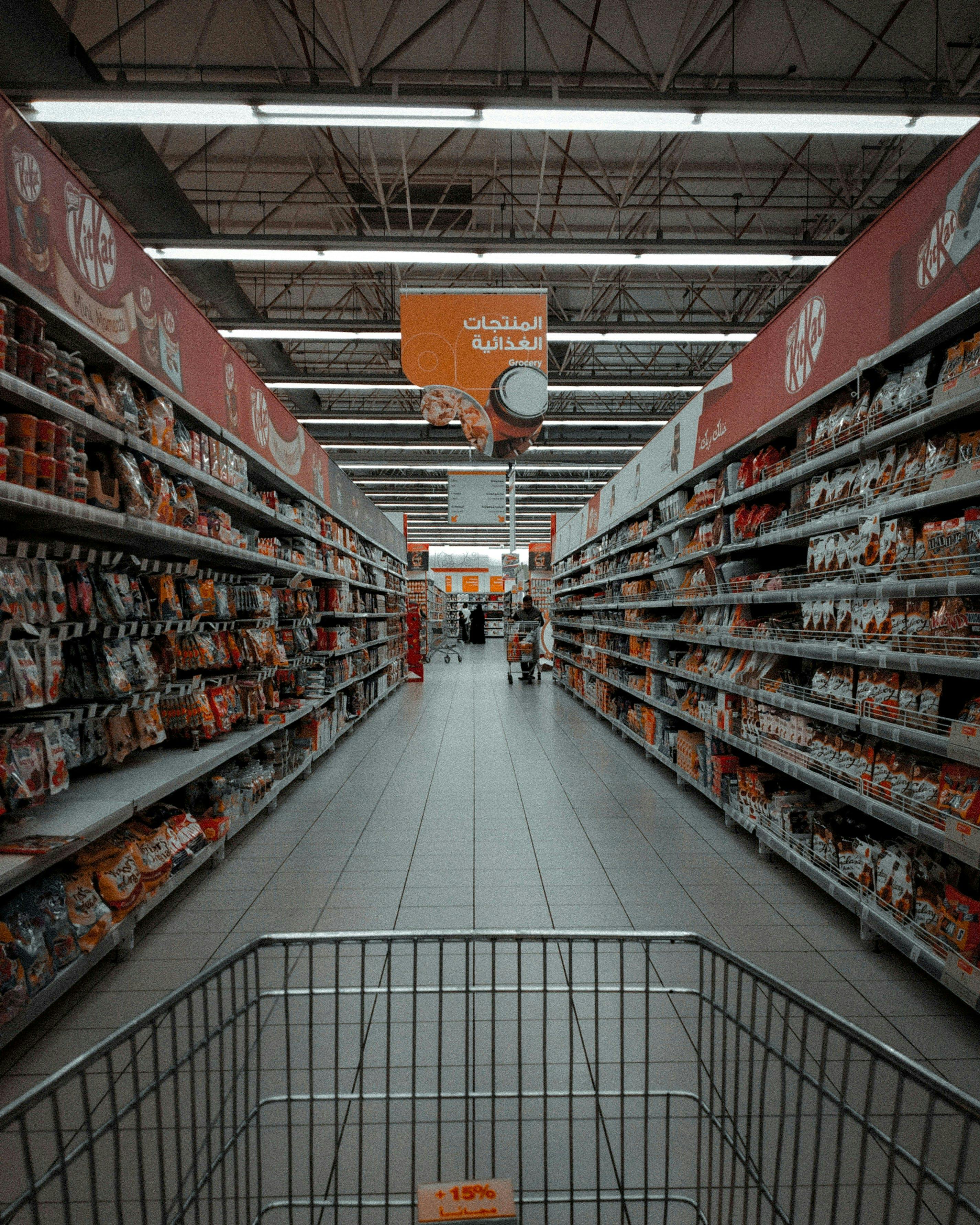The Consumer Upside Of An Economic Downturn
Dollarama stock is up. Google searches for “drive-in movies”, “cheap things to do for fun”, and “freezers” are at an all-time high. Individuals are buying more instant noodles. It’s clear that as the economy changes, consumer behavior is changing along with it. But these impacts aren’t as unpredictable as they might seem. With each recession, researchers aim to detail and explain how consumers react to the downturn. And based on these analyses, we can see a clearer picture of what is to come with future recessions.
Consumer responses to recessions can be counterintuitive but can lead to personal growth. Recently, researchers built a framework for consumer responses to financial hardship based on previous recession research. Among all findings, they noticed a pattern of response during an economic downturn. As consumers experience financial restriction, they tend to demonstrate the following steps: “React, Cope, and Adapt”.1
Recessions impact consumers in multiple ways, whether it be their financial limitations, employment opportunities, or through supply chain breakdowns. Among recession research, there are four main perspectives for how economic restriction can impact individuals:
- Resource scarcity (limited access to money)
- Choice restriction (limited options)
- Social comparison (an individual’s ability to elevate their social status)
- Environmental uncertainty (the predictability of the economic environment)1
Individuals respond differently to each perspective. But in many cases, this reactive behavior results in favorable growth in the long term. Recessions are in no way good, but they might strengthen our behavior in unique ways — like shaping how businesses approach consumerism once the recession is over.
Behavioral Science, Democratized
We make 35,000 decisions each day, often in environments that aren’t conducive to making sound choices.
At TDL, we work with organizations in the public and private sectors—from new startups, to governments, to established players like the Gates Foundation—to debias decision-making and create better outcomes for everyone.
Money myopia: economic restriction causes an increased focus on finances
Consumers have a heightened sense of their access (or lack thereof) to money during recessions. Initially, most consumers react with an increased focus on the price of goods, ignoring quality or other details.2 This focus can be so intense that it even causes cognitive burden.3
There are long term behavioral benefits from these financial restrictions. In an attempt to lessen the burden of financial restriction, consumers more effectively use their resources. Consumers post-2008 recession were better at addressing opportunity costs and making decisions.1 Individuals who were exposed to financial restriction over a long period of time were so aware of monetary value that they were less susceptible to pricing tricks, hidden fees, and taxes.1
Today, experts are predicting a similar movement among younger generations in the post-pandemic phase. They note this generation will be more enlightened with their spending — they will expect a higher return from purchases while also considering their social impact.4,5,15 The implications of this are crucial for a functioning economy.
How restricted options help creativity and happiness
“We want what we can’t have” — and in a recession, we want it even more. This familiar behavior even impacts those who aren’t experiencing financial restriction, yet feel restricted because they feel that they should prepare for a downturn.5 Once we notice our limitations, we intently focus and frustrate ourselves with them.
When faced with limited choices, consumers cope by savoring ordinary moments. Consumers shift their spending habits towards lower-cost goods that provide feelings of enjoyment or luxury. For example, in past downturns, women have consistently bought more lipstick.1 This behavior is occurring even today. Sales in clothing retail are decreasing, compared to their usual increase in years prior.8,9,10 Demand is shifting toward providing higher quality products in smaller sizes.7
Instead of purchasing plane tickets for exotic locations, consumers are spicing up their summers with more purchases of home party sprinklers and party leis.6 Consumers are looking for more frugal ways to enjoy ordinary moments, instead of spending money on goods like apparel. Our attempt for enjoyment will still prevail, but it may be more of a “bite-sized” fun than a true indulgence.
The AI Governance Challenge
Not only do individuals better enjoy ordinary experiences, but they are also more creative with their limitations. Researchers at John Hopkins University and the University of Illinois asked participants to complete tasks such as creative writing, solving problems, or creating products. The participants who were asked to think of their experiences with scarcity produced more novel products and suggested better solutions with their products.11 Ethnographic studies have shown individuals from lower socioeconomic backgrounds have a better ability to use everyday products in a variety of ways, such as using tinfoil for wallpaper.11,12 Limited choice availability may cause negative behavior upfront, but in the long term can drive innovation.
Economic uncertainty causes focus on the short term
Another aspect of a recession is that it throws us into uncertainty. In order to cope, reactions span from buying beauty products to gaining a sense of control or eating higher-calorie foods.1 During these times, we are more likely to value short term information. For example, investment managers are being urged to update how they supply information to clients in tighter cycle times with more real-world activity.13 The irrational decision making can go as far as to impact our parenting — where parents are found to spend more on their daughters than their sons when they are doubtful about their financial future.14 The research suggests that people consider their daughters more likely than their sons to have children, and unconsciously cater to ensure their family descent. These examples demonstrate how uncertainty influences our decisions in strange ways. We unknowingly think long-term but prefer guarantees to assure us.
What to watch out for in the coming months
To summarize these behavior changes, there are three pieces of insight to keep in mind as consumers enter another recession:
- A little goes a long way – across all of the different categories in a recession, we learn to live with less. Whether it is savoring moments with increased limitations, or buying smaller goods to feel luxury on a budget, consumers focus on using their financially available means to make memorable experiences in any way they can.
- Money on the mind – all people have an increased awareness of the economy during a downturn. Consumers in times of financial hardship are more price-aware and are aware of changes in the economy as they use the information to prepare themselves.
- The upside of a downturn – initially, we may respond abruptly to a recession. But our coping mechanisms in the long term spur beneficial change like more innovative behavior, and reduced susceptibility to pricing tricks.
People are adapting. Those are the folks that will do more than just survive. They are going to explode in positivity afterwards.
– Stephen Poloz
Adaptability is on our minds with the current onslaught of new events on a weekly basis. Through analyzing previous recession research, we know that consumers cope with financial hardship in unique ways. Yet these very same coping mechanisms can ignite long-term behavioral changes that bring substantial benefits. Although we can’t yet predict the consumer who will emerge from this recession, we have a good idea they will be more aware, innovative, and resilient than before.
References
- Hamilton, R. W., Mittal, C., Shah, A., Thompson, D. V., & Griskevicius, V. (2019). How Financial Constraints Influence Consumer Behavior: An Integrative Framework. Journal of Consumer Psychology, 29(2), 285–305. https://doi.org/10.1002/jcpy.1074
- Tomm, B. M., & Zhao, J. (2016). Scarcity captures attention and induces neglect: Eyetracking and behavioral evidence. In A. Papafragou, D. Grodner, D. Mirman & J. C. Trueswell (Eds.), Proceedings of the 38th Annual Conference of the Cognitive Science Society (pp. 1199–1204). Austin, TX: Cognitive Science Society.
- Mani, A., Mullainathan, S., Shafir, E., & Zhao, J. (2013). Poverty impedes cognitive function. Science, 341, 976–980. https://doi-org.ezproxy.lib.ucalgary.ca/10.1126/science.1238041
- Bakhitiari, K. (2020). How Will The Pandemic Change Consumer Behavior. Forbes. From https://www.forbes.com/sites/kianbakhtiari/2020/05/18/how-will-the-pandemic-change-consumer-behavior/#386ea78066f6
- Carmichael, K. (2020, May 22). As recession reshapes consumer and corporate behaviour, smart companies will seize chance to change | Financial Post. https://business.financialpost.com/news/economy/as-recession-reshapes-consumer-and-corporate-behaviour-smart-companies-will-seize-chance-to-change
- Changes in Consumer Behavior: Rising Retail Categories. (2020). Think with Google. Retrieved June 14, 2020, from https://www.thinkwithgoogle.com/feature/category-trends/us/month/en
- Chiang, C. (2020, May 22). China’s post-COVID consumer trends may offer preview of B.C.’s own future—Asia Pacific | Business in Vancouver. https://biv.com/article/2020/05/chinas-post-covid-consumer-trends-may-offer-preview-bcs-own-future
- Howland, D. (2020, June 10). Apparel margins take a hit as retailers face a new future | Retail Dive. RetailDive. https://www.retaildive.com/news/apparel-margins-take-a-hit-as-retailers-face-a-new-future/579542/
- Thomas, L. (2020, June 11). Lululemon sales fall 17% as retailer takes hit from stores being closed, shares drop. CNBC. https://www.cnbc.com/2020/06/11/lululemon-lulu-reports-fiscal-q1-2020-earnings.html
- US retail sales beat expectations in June. (2019, July 16). CNBC. https://www.cnbc.com/2019/07/16/retail-sales-june-2019.html
- Mehta, R., & Zhu, M. (2016). Creating when you have less: The impact of resource scarcity on product use creativity. Journal of Consumer Research, 42, 767–782. https://doi-org.ezproxy.lib.ucalgary.ca/10.1093/jcr/ucv051
- Rosa, J. A., Geiger-Oneto, S., & Fajardo, A. B. (2012). Hope and innovativeness: Transformative factors for subsistence consumer-merchants. In Transformative consumer research for personal and collective well-being (pp. 151–170). Routledge/Taylor & Francis Group.
- The impact of COVID-19 on investment management | Deloitte Insights. (2020). Retrieved June 14, 2020, from https://www2.deloitte.com/us/en/insights/economy/covid-19/investment-management-impact-of-covid-19.html
- Durante, K. M., Griskevicius, V., Redden, J. P., & White, A. E. (2015). Spending on daughters versus sons in economic recessions. Journal of Consumer Research, 42, 435–457. https://doi-org.ezproxy.lib.ucalgary.ca/10.1093/jcr/ucv023
- Landrum, S. (2016). Why Millennials Care About Social Impact Investing. Forbes. Retrieved June 17, 2020, from https://www.forbes.com/sites/sarahlandrum/2016/11/04/why-millennials-care-about-social-impact-investing/
About the Author
Kaylee Somerville
Kaylee is a research and teaching assistant at the University of Calgary in the areas of finance, entrepreneurship, and workplace harassment. Holding international experience in events, marketing, and consulting, Kaylee hopes to use behavioral research to help individuals at work. She is particularly interested in the topics of gender, leadership, and productivity. Kaylee completed her Bachelor of Commerce degree from the Haskayne School of Business at the University of Calgary.




